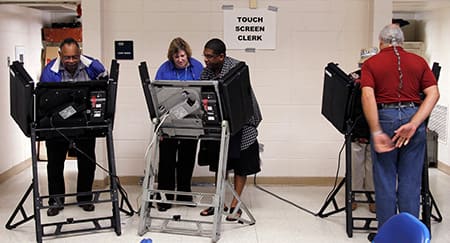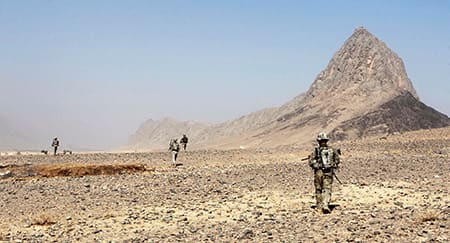The mid-term election results are not all bad news for President Obama, argue Professor Dobson and Dr MacDonald. But their impact on the US foreign policy room for manoeuvre - and the effect on NATO - could be more difficult to predict.
Mid-term elections can drastically change America’s political landscape. And it is almost always the President’s party which suffers, further cementing the idea that mid-terms can have a transformative impact.
This has happened this year with Democrats losing the House and only narrowly clinging on to the Senate. But do such changes count for anything abroad?
At first glance, it seems not. Apart from very obvious intermestic matters such as illegal immigration and drug trafficking, mid-term electioneering rarely extends beyond state or national-domestic issues. Typically, Presidents play only a limited role and since President Obama was not up for re-election, and since many Democrats tried to distance themselves from his unpopularity, foreign policy hardly featured.
When Presidents have tried to inject a broader focus, there have been negative repercussions as Franklin Roosevelt found to his cost in the 1938 mid-terms. However, the elections on 2nd November occurred amidst an unprecedented array of international concerns for Americans. So will the power shift on Capitol Hill have any impact on US foreign and defence policies?
Difficulties between the military and the White House have been legion
Even with a legislative majority, President Obama had problems with his foreign policy and his foreign policymaking team: frankly, both are struggling.
Bob Woodward’s ‘Obama’s Wars’ exposed numerous issues and his revelations have had considerable repercussions. It is true that Hilary Clinton has been an effective Secretary of State; experience and continuity have also been provided by Secretary of Defence Robert Gates during the last two years, although he will retire in 2011.
But even with Gates in post, difficulties between the military and the White House have been legion.
Posing even more of a problem is the National Security Council. Amidst the concerns aroused by ‘Obama’s Wars’ and the declining authority of the Administration, National Security Adviser (NSA) General James Jones resigned and was replaced by his deputy Tom Donilon. However, the problem is broader than just a re-shuffling of posts.
As with Condoleezza Rice in the Bush Administration, there are concerns that the NSA is not orchestrating a coherent foreign and defence policy operation. Given these highly-publicised dynamics, and given the many complicated challenges he already faces, the Republican victory in the House of Representatives does place greater pressure on President Obama.
President Clinton and the 104th Congress
The last time a Democratic President confronted similar political challenges was when President Clinton faced a hostile Republican majority in both houses of Congress in 1994. Steeling themselves to attack a broad portfolio of Clinton policies, Republicans focused their opposition on the ongoing Bosnian War and US participation in United Nations peacekeeping efforts.
However, their efforts to derail Clinton in these areas largely failed. Clinton vigorously exerted his authority – he promised to veto congressional efforts to encroach upon his policy preferences and to circumvent any congressional fiscal obstinacy aimed at impeding them – and this proved effective. However, legislators also demonstrated a consistent unwillingness to follow through their threats, especially if it seemed they might undermine Clinton’s international status.
Even major mid-term losses need not necessarily produce a ‘lame duck’ foreign policy President
The executive-legislative dynamic after the 1994 mid-terms reflects an often-overlooked characteristic of executive-legislative foreign policy relations: presidential vigour coupled to Congress’ willingness to defer to the President at times when the issues, and the risks, are at their gravest.
While Presidents cannot necessarily rely upon this deference, Clinton’s experience shows – as did Ronald Reagan’s in 1982 – that even major mid-term losses need not necessarily produce a ‘lame duck’ foreign policy President. Both Clinton and Reagan also won second terms, demonstrating that the two years which follow mid-term defeats allow ample time for a President to recover broad national support. For Obama, all is still to play for.
President Obama and the 112th Congress
Obama will not face a ‘Republican Revolution’ but the possibilities for confrontation are many and the Tea Partiers’ domestic obsessions may distract from foreign issues.
However, military personnel and equipment challenges, military spending and Iraq and Afghanistan withdrawals will certainly loom large. Developments in Iran and Yemen, sales of Russian ‘super-missiles’ that can destroy US aircraft carriers, and continuing Chinese militarism in air, sea and space will also exercise concern.
Despite the potential for confrontation, however, a GOP victory need not spell doom for Obama.
The Republicans fall short of the votes needed to over-ride presidential vetoes. There is also every reason to expect that ‘crisis-induced consensus’ will continue to infuse much of the legislature’s foreign policy judgement. Whilst bipartisanship has been notably absent in the domestic sphere recently, it is much more common and resilient in the foreign field. Ironically, the Republican victory in the House may actually promote it even more: with power comes visible responsibility.
The need for the US to ‘win’ what it started after 9/11 has been articulated with great stridency across the political spectrum in the past nine years but there is a palpable sense in Washington currently that the United States has ‘lost control’. This may actually work for Obama. Many still see President Bush as responsible for much of the problem and Obama has the political skills to reinvigorate America’s confidence over its security and global standing.
Whilst domestic performance and popularity invariably feed into how the President is viewed as Commander-in-Chief, Obama will benefit if he is seen to demonstrate strong and skilled leadership on what even his staunchest opponents acknowledge are hugely difficult international issues.
Precisely how well he will manage to demonstrate this leadership will depend greatly upon how he deals with two key issues: the consequences of severe budgetary constraints throughout the Western Alliance; and the wisdom he exercises in making strategic and military decisions.
Money
Whichever economic path he favours – parsimony or liberality – President Obama will not escape censure.
Despite nationwide demands for federal austerity, many conservatives oppose Obama’s defence spending proposals and with influential right-wing think tanks such as the Heritage Foundation encouraging Congress to ‘openly confront’ the Obama ‘underspend’, a Republican-dominated Hill may well push for greater defence expenditure. If Obama is not seen to be improving America’s fortunes abroad, manpower and aircraft shortages might be held up as evidence of his lack of commitment to defence and key reasons why the US is not faring better.
Washington vigorously opposes any Allied defence cuts and may see them as yet more evidence of a transatlantic ‘commitment gap’ over NATO
The financial decisions taken in Washington do not alone define the path of US and NATO policy, however. The austerity measures of America’s key NATO allies are also significant.
France, Italy and Germany are committed to reductions in military spending. America’s key ally, Britain, is currently debating up to 10% reductions in defence spending for the 2011-2015 period. Washington vigorously opposes any such cuts and may see them as yet more evidence of a transatlantic ‘commitment gap’ over NATO.
We should note, however, that these concerns have been recurrent issues in the alliance for years and Washington has never been able to exert anything like total authority within NATO and get its way.
Even so, the increasingly lukewarm European commitment to what Washington seems to want for NATO raises grave questions across the Alliance.
Another potential problem is the recently signed Anglo-French Defence Treaties. They raise yet again the possibility of an increased potential for an independent European military capability that might rub abrasively up against NATO. How that is seen in Washington by Republicans, some with strong aversions to continental Europe and evincing vestiges of isolationism, may constrain Obama’s policy preferences.
Intervention and Exit Issues
The funding of America’s military commitments is not all that is open to debate. Military strategy itself is hugely divisive and Obama treads a fine line in steering it. Whilst he and British Prime Minister Cameron have designated 2011 as the start-date for Afghanistan withdrawal, influential figures have publicly dissented.
On stepping down as head of UK armed forces, Air Chief Marshall Sir Jock Stirrup posited 2015 as a realistic withdrawal date. General David Petraeus also advises caution on an early withdrawal. Afghanistan is already a poisoned chalice for Obama, as is Iraq: his drawdown plans for both countries are sure to prompt criticisms from those who advocate ‘staying the course’.
If factions within the new Republican House majority and the military begin arraying themselves along different policy positions, and if this positioning is replicated in various forms across the Alliance, Obama’s task will be further complicated: any decisions he takes may be viewed even more negatively and his political credibility – and his authority – can only be undermined.
Such a diminution could have broader repercussions. With intervention-advocacy hugely diminished across NATO, the idea of the US and its allies embarking on yet another military intervention is, to many, unthinkable. For all the concerns over Washington’s post-9/11 militarism, however, no NATO member wants to see the US hamstrung, especially with so many issues of concern to the allies.
Problems with Iran, North Korea, Yemen, and in the South China Sea may demand US or NATO attention but if this can effectively be ruled out due to US domestic political dispositions, the Alliance is on very rocky ground.
Maybe the greatest danger of the mid-term elections is that the Republican resurgence swells America’s disgruntlement with Obama, diminishing his authority
Often, no intervention is necessary because the threat of intervention is sufficiently intimidating; for this to happen, however, the threat has to be plausible, the target state responsive. Maybe the greatest danger of the mid-term elections is that the Republican resurgence swells America’s disgruntlement with Obama, diminishing his authority, and drags foreign policymaking into internecine domestic wrangling over the economy and federalism.
It is up to the President to ensure that this does not happen. It is a daunting challenge.




